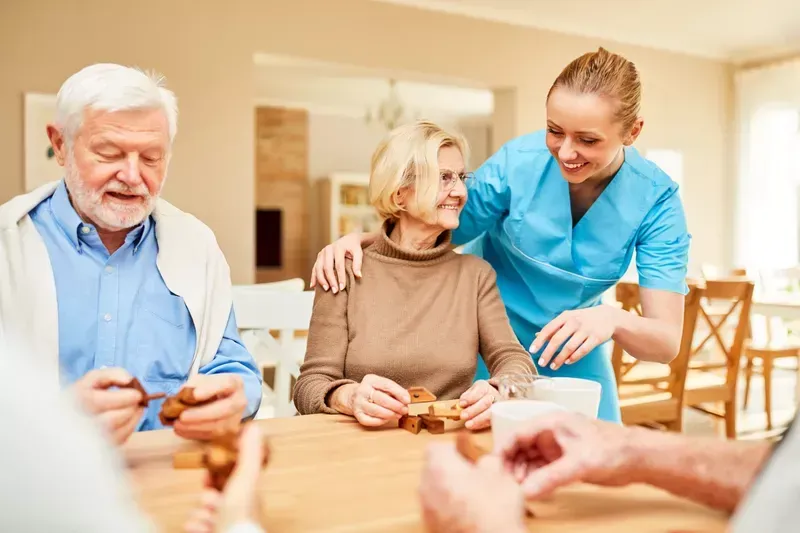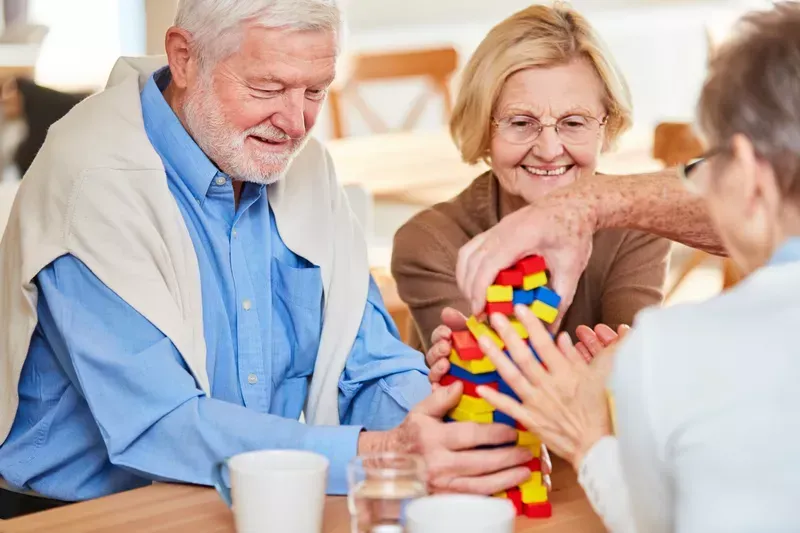BLOG
How Assured Senior Living Adapts to Changing Health Needs
At Assured Senior Living, the focus on personalized care ensures residents receive the support they need as their health changes. Every resident is unique, and their care plans must meet their individual needs. This approach comes from the belief everyone deserves to live with dignity and purpose, regardless of health challenges. As residents’ health needs evolve, Assured Senior Living adjusts its care plans accordingly, ensuring that every resident receives the highest quality of care.
The staff at Assured Senior Living recognizes and responds to residents' changing health needs. Whether it's a shift in cognitive function, mobility, or overall health, the team can make necessary adjustments.
Families play a crucial role in this personalized care model. Assured Senior Living encourages regular communication between families and care teams, ensuring everyone is on the same page regarding a resident’s health. This collaborative approach fosters a strong support network that adapts to the changing needs of residents, providing peace of mind for both residents and their loved ones.
Adapting to Cognitive Changes
Assured Senior Living is particularly adept at handling cognitive changes, such as those associated with dementia or Alzheimer’s. The facility’s specialized memory care programs support residents through every stage of cognitive decline. These programs offer a structured environment that promotes safety while also allowing residents to maintain a sense of independence. As cognitive needs change, the care team also adjusts the level of support, ensuring residents are always in the best possible environment for their needs.

The memory care facilities at Assured Senior Living are designed to be both comforting and stimulating. We encourage residents to participate in activities that are both enjoyable and beneficial for cognitive health. This might include memory games, music therapy, or simply enjoying a peaceful moment in a sensory garden. The goal is to create an environment where residents feel safe, understood, and valued, even as their cognitive abilities change.
In addition to these structured activities, Assured Senior Living emphasizes the importance of routine in its residents' lives. A consistent daily schedule helps reduce anxiety and confusion, which are common in individuals with cognitive impairments. The staff works closely with residents and their families to develop routines that are both comforting and effective, adjusting as needed when health changes occur.
Supporting Physical Health and Mobility
Physical health and mobility are key aspects of care. The facility offers a range of services designed to help residents maintain their physical health for as long as possible. This includes regular health assessments, physical therapy, and personalized exercise programs. As residents' physical health needs change, the care team is quick to adapt, ensuring that residents continue to receive the appropriate level of care and support.
The physical environment at our facilities support mobility and safety. Hallways are wide and well-lit, with handrails and non-slip flooring to prevent falls. For residents who require mobility aids, such as walkers or wheelchairs, the facility ensures these are readily available and well-maintained. Additionally, the trained staff can assist residents with mobility challenges, providing support with daily activities like bathing, dressing, and moving around the facility.
Nutrition is another important aspect of physical health that Assured Senior Living prioritizes. The facility’s dining program offers balanced, nutritious meals that cater to residents’ dietary needs and preferences. As health needs change, so too does the menu, with the dietary team working closely with healthcare providers to ensure that residents receive meals that support their overall well-being.
Emotional and Social Support at Assured Senior Living
Emotional and social well-being are integral to the care provided at Assured Senior Living. The facility understands that as health needs change, residents may experience feelings of anxiety, depression, or isolation. To combat this, Assured Senior Living offers a variety of programs designed to support emotional health and encourage social interaction. These programs include group activities, one-on-one counseling, and opportunities for residents to connect with their peers.

The staff at Assured Senior Living are trained to recognize signs of emotional distress and take appropriate action. Whether it’s providing a listening ear, offering counseling services, or arranging for family visits, the team is dedicated to ensuring residents feel supported and valued. Regular social activities, such as arts and crafts, movie nights, and group outings, also help to keep residents engaged and socially active, which is crucial for emotional well-being.
Family involvement is encouraged at every stage of care. Assured Senior Living understands that maintaining strong connections with loved ones is essential for residents' emotional health. The facility provides multiple avenues for family interaction, including regular family meetings, social events, and open visitation policies. This strong support network helps residents navigate the emotional challenges that can arise as health needs change.
Assured Senior Living’s Commitment to Continuous Improvement
Assured Senior Living is committed to continuous improvement in all aspects of care. The facility regularly evaluates its care programs to ensure they meet the evolving needs of residents. Feedback from residents, families, and staff is crucial for improvements. This commitment to quality ensures that Assured Senior Living remains a leader in the field of senior care, always striving to provide the best possible experience for its residents.
The facility also stays up-to-date with the latest advancements in senior care. This includes adopting new technologies, implementing best practices, and staying informed about new research in the field. By continuously improving its services, Assured Senior Living ensures that it can adapt to the changing health needs of its residents, providing them with the highest standard of care.
Assured Senior Living’s commitment to excellence extends to its staff as well. The facility invests in ongoing training and professional development. This ensures that all team members have the knowledge and skills they need to provide top-quality care. This dedication to continuous improvement also helps create a positive environment where residents can thrive, even as their health needs evolve.
Planning for the Future with Assured Senior Living
As health needs change, planning for the future becomes increasingly important. Assured Senior Living works closely with residents and their families to develop long-term care plans that anticipate future needs. This proactive approach helps to ensure that residents continue to receive the care they need, even as their health evolves. By planning ahead, residents and their families can feel confident that they are prepared for whatever the future may hold.
Assured Senior Living also offers resources and support to help families navigate the complexities of long-term care planning. This includes guidance on financial planning, legal considerations, and healthcare decision-making. By providing this support, Assured Senior Living helps families feel more confident and empowered as they make important decisions about their loved one’s care.
Assured Senior Living is dedicated to adapting to the changing health needs of its residents. With personalized care, a focus on cognitive and physical health, and a commitment to continuous improvement, Assured Senior Living ensures that residents receive the highest quality of care throughout their journey. If you want to learn more about how Assured Senior Living can support your loved one’s changing health needs, contact us today to schedule a tour or speak with one of our care specialists.
Remember, Assured Senior living Care Homes go beyond just providing care—they are committed to crafting deeply personalized care plans that honor the unique needs, history, and dignity of every resident. Our homes are places where compassion runs deep, creating nurturing environments that don’t just support daily living but truly elevate and enrich the lives of those facing memory challenges. The heart of your decision is driven by love, the need to find a place where your loved one isn’t just cared for, but truly seen, understood, and cherished—a place where their specialized care plan is designed just for them, ensuring they receive the thoughtful, attentive support they deserve.















